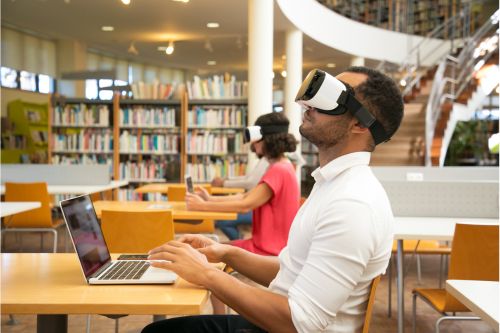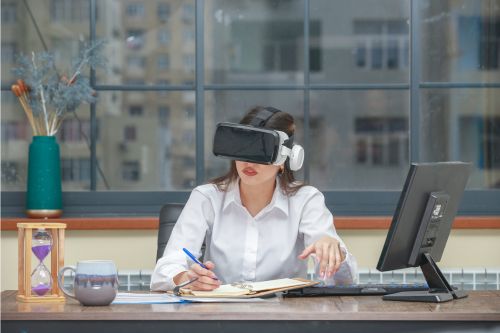Table of Contents
About virtual reality
Virtual Reality (VR) is an immersive technology that enhances teaching and learning experiences. By creating realistic simulations of real-world environments, VR can provide students with an interactive way to explore complex concepts and ideas. In recent years, virtual reality courses abroad have become more prevalent, providing students with a new way to learn about subjects from the comfort of their homes.
Virtual reality courses allow students to experience a range of environments and situations that may be challenging or impossible to access in the real world. For example, biology students may use VR to explore a virtual ecosystem, while those studying history may use it to experience a historical event. Virtual reality courses help students better understand and retain complex concepts and ideas by providing an immersive and interactive environment.
Benefits of studying virtual reality courses abroad
1. Skill Development
Some virtual reality courses provide students with hands-on experience designing, developing, and managing virtual reality projects. Employers seek the skills acquired through these courses.
Virtual reality courses provide students with practical experience in cutting-edge technology, rapidly growing in popularity. Students learn to work with virtual reality equipment and software, gaining valuable experience to apply to real-world projects.
2. Exposure to global trends
Studying VR abroad offers an opportunity to learn about global trends and developments in the field. Exposure to diverse cultures, learning from international faculty and classmates, and experiencing a different education system can broaden one’s perspective and enhance their knowledge.
3. Access to better infrastructure
Many universities abroad have state-of-the-art infrastructure, including advanced VR labs, allowing students to gain hands-on experience with the latest VR technologies and techniques.
4. Career opportunities
Studying VR abroad can open up many career opportunities, as many multinational companies require professionals with expertise in VR technology. An international degree in VR can help students stand out in the job market and improve their employability prospects.
5. Language skills
Studying abroad provides an opportunity to learn a new language, improving one’s communication skills and cultural understanding. This can be an asset when working in international settings and dealing with clients or colleagues from diverse backgrounds.
6. Personal growth
Studying VR abroad can be a transformative experience, allowing students to explore new cultures, build international connections, and gain independence and self-reliance.
Top 10 ten colleges to study virtual reality

- Massachusetts Institute of Technology
- Stanford University
- University of Southern California
- University of Washington
- New York University
- Georgia Institute of Technology
- University of California – Berkeley
- Rochester Institute of Technology
- Texas A&M University at College Station
- University of North Carolina at Chapel Hill
Virtual reality courses
BA (Hons) Virtual and Augmented Reality
Do you want to work as a designer in the AR/VR industry? If yes, this is your bachelor’s degree. Students will learn the skills necessary to create VR/AR simulations, games, visualizations, and apps. This covers generating digital artwork in 2D and 3D, computer animation, and sound for VR/AR.
BSc Virtual and Augmented Reality
The degree will help you if you want to become an AR/VR developer, unity/unreal engine developer, computer vision architect/engineer, C++/C# developer, and more. Students can use industry-standard software like game engines and source development kits. They can also use the most recent commercial peripherals, such as the Oculus Rift and HTC Vive, electroencephalograms (brainwave interfaces), heart monitors, and facial recognition systems.
MSc Immersive Technology MSc
The master’s curriculum focuses on sensory presentation engineering and immersive technology’s hardware and software requirements. Students will learn about human perception and its practical delivery through virtual reality. It is a postgraduate qualification aimed at students interested in a career in digital engineering, research, or a Ph.D. in the field.
MA Virtual Reality
The master’s program is for students who want to discover and develop the application of VR technologies across visual effects (VFX), filmmaking, animation, games, and immersive augmented reality (AR) experiences. Students will acquire the technical resources and expert advice needed to test and develop virtual experiences across various media platforms, including 3D computer animation, 360-degree filming, games, and interactive AR applications.
Scope after studying virtual reality courses abroad

Studying virtual reality courses abroad can open up many exciting career opportunities for graduates. Virtual reality is a rapidly growing field. Technological advancement increases the demand for professionals who can create, design, and manage virtual reality projects.
Game design
One potential career path for virtual reality college graduates is game design and development. Virtual reality technology will revolutionize the gaming industry. It will provide players with an immersive and interactive gaming experience. Graduates with a background in virtual reality can work as game designers, programmers, and artists, developing games that take full advantage of VR technology.
Education
Another potential career path is education. Graduates can work as instructional designers, creating virtual reality-based learning materials for schools and universities. They can also work as teachers, using virtual reality to create engaging and interactive classroom experiences.
Healthcare
Virtual reality also has applications in healthcare, where it can simulate medical procedures and provide training for healthcare professionals. Graduates with a background in virtual reality can work as medical illustrators, creating virtual reality-based simulations of medical systems. They can also work as medical trainers, developing virtual reality-based training programs for healthcare professionals.
Architecture
Virtual reality can create immersive 3D visualizations of buildings and structures in the architecture and construction industries. Graduates with a background in virtual reality can work as designers who create virtual reality-based models of buildings and structures. They can also work as construction managers. They will provide visualizations of construction projects to clients and stakeholders.
Entertainment
Virtual reality also has applications in the entertainment industry, where it can be used to create immersive experiences for movies, television shows, and other forms of media. Graduates with a background in virtual reality can work as special effects artists, using virtual reality to create realistic and engaging visual effects for movies and television shows. They can also work as producers and directors, creating virtual reality-based experiences for audiences.
Marketing
Another potential career path for graduates of virtual reality courses is in the field of marketing and advertising. Virtual reality can create immersive and interactive marketing experiences, providing customers with a unique and engaging way to learn about products and services. Graduates with a background in virtual reality can work as marketing managers, creating virtual reality-based marketing campaigns for companies and brands.
Key takeaways
- Virtual reality is essential to people’s daily lives. You can use this technology to test product designs and simulate user contact anywhere.
- Candidates passionate about coding, graphics programming, 3D modeling design, and game creation might pursue this course because various IT organizations offer work opportunities in these career routes.
- Virtual reality learning can be more cost-effective.
- Studying virtual reality courses abroad will give you better infrastructure, global exposure, and career opportunities.
With cutting-edge technology and expert instruction, virtual reality courses abroad are quickly becoming the future of education. It allows students to gain practical skills and experience in various fields while broadening their horizons and expanding their global perspectives. Please don’t hesitate to contact us if you’re interested in studying abroad and want information on international universities.
Liked this blog? Read next: Ohio State University’s postgraduate courses for career advancement
FAQs
Q1. What are the three types of virtual reality?
Answer- Non-Immersive, Semi-Immersive, and Fully Immersive are the three types of virtual reality.
Q2. Are VR engineers in demand?
Answer- According to reports, augmented reality and virtual reality positions are in high demand, which increased by 1,400% in 2019.
Q3. What is an example of a virtual application?
Answer- Virtualized apps run without another operating system or browser. One example is virtualizing Microsoft PowerPoint on Ubuntu over an Opera browser.







